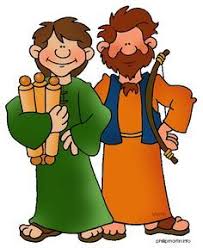Zechariah 7:1 – In the fourth year of King Darius, the word of the Lord came to Zechariah on the fourth day of the ninth month, which is Chislev.
Welcome back, dear readers! I hope you enjoyed (and benefitted from) our study of the visions of Zechariah.
One of the wonderful things about Zechariah is that he gives us several dates as well as the names of rulers, which help us to date his work. Chapter 7 takes place around 518 BC, which was two years after the series of visions and two years before the completion of the temple (Ezra 6:15). In our calendar, the month Chislev corresponds to mid November thru mid December.
Zechariah 7:2 – Now the people of Bethel had sent Sharezer and Regem-melech and their men to entreat the favor of the Lord
As you recall, the city of Bethel is mentioned numerous times in the Old Testament.
- Abram stayed there for a while, as he was journeying around the Promised Land, before God had given him children (Genesis 12:8). Abram built an altar to the Lord at that place, and he sought the presence of the Lord there.
- Later, his grandson Jacob would stay in the same place as he was fleeing from his brother, after he 'bought' Esau's birthright. This was the place where he had his famous vision of the ladder leading up to heaven (Genesis 28:10-22).
- Bethel is approximately 12 miles north of Jerusalem. When the Promised Land was divided up by tribes, Bethel fell to the tribe of Benjamin, but they were unable to conquer it, and it was finally settled by the men of Ephraim.
- Later, Bethel was one of the cities that Samuel visited on his rounds as a circuit judge of the nation (I Samuel 7:16).
- During the era of the kings, the city fell into apostasy under King Jeroboam, who erected an idol there (a calf) for the people to worship instead of going to the temple in Jerusalem (I Kings 12:26-29).
- After the fall of Israel and the captivity, we find that a number of the men of Bethel left Babylon to come to Jerusalem and help rebuild the temple (Ezra 2:28, Nehemiah 7:32).
Bethel had long been a place where men had sought the Lord. In this particular instance, we find that the leaders of Bethel sent a delegation of men to Jerusalem for the express purpose of seeking some answers from the Lord.

We do not know how many men were in the group, but we do know the leaders of the delegation were Sharezer and Regem-melech. Nothing else is known about these men. All we can surmise is that they were important men of that day, for it would be an insult to the priests, prophets and men of Jerusalem to send common or unimportant persons on such a visit.
The purpose of their visit was to 'entreat the favor of the Lord'. In other words, they were seeking an answer from the Lord concerning a specific situation which was very important to them.
The word 'entreat' means more than just praying. It also includes elements of sacrifice, worship and seeking council from the religious leaders (priests and prophets). The men of Bethel realized that only place where the Lord could properly be consulted was in Jerusalem. Even though the temple was not yet complete, the Jews in Jerusalem had erected an altar and were offering regular sacrifices to the Lord, which meant that fellowship with God had been re-established:
Ezra 3:3,6 - And they set the altar upon its bases; for fear was upon them because of the people of those countries: and they offered burnt offerings thereon unto the LORD, even burnt offerings morning and evening From the first day of the seventh month began they to offer burnt offerings unto the LORD. But the foundation of the temple of the LORD was not yet laid.
So the citizens of Bethel formed a committee, packed their bags, gathered money/goods for a gift, selected animals for the sacrifices and set out for the former capital.
Zechariah 7:3 - saying to the priests of the house of the Lord of hosts and the prophets, "Should I weep and abstain in the fifth month, as I have done for so many years?"
Now we discover the question or issue that these men wanted to bring before the Lord: Should they continue to weep and abstain in the fifth month, as they had been doing for many years, or could they stop doing that?

What are these men referring to?
When Nebuchadnezzar captured the city of Jerusalem, one of the things he did was burn the city. Specifically, he burned the king's house, the house of the Lord (Solomon's temple) and all the rich men's homes. This occurred on the tenth day of the fifth month:
Jeremiah 52:12-13 - Now in the fifth month, in the tenth day of the month, which was the nineteenth year of Nebuchadnezzar king of Babylon, came Nebuzar-adan, captain of the guard, who served the king of Babylon, into Jerusalem, and burned the house of the LORD, and the king's house; and all the houses of Jerusalem, and all the houses of the great men, burned he with fire:
However, it should be noted that based on other scriptures, these fires may have begun on the seventh of the month and finally burned out on the tenth day (see II Kings 25:8-10).
At any rate, the 'weeping and abstaining' was in regard to the destruction of the temple.
Remember, the temple was the place of fellowship between God and man. It was the location where sacrifices were brought to the Lord and the place where the high priest made atonement for their sin. It was the place where the annual feasts were celebrated and the people were blessed. The temple was a symbol of the national identity of the Jews. Its destruction was the most grievous thing that had ever happened to them.

So the Jews established a day of mourning and fasting in the fifth month to commemorate this loss.
Furthermore, this was not the only day of national weeping and fasting.
After Nebuchadnezzar has taken the city, he removed nearly all of the inhabitants, leaving just enough people so that the land of Israel did not turn into a wild wasteland. Those that remained (the poor) were to continue shepherding and growing crops. At that time, he named Gedaliah as ruler over Jerusalem (II Kings 25:22).
However, several years after Gedaliah became ruler, he was murdered in the seventh month of the year and subsequently, the remainder of the Jews were driven from the land.
2 Kings 25:25 - But it came to pass in the seventh month, that Ishmael the son of Nethaniah, the son of Elishama, of the seed royal, came, and ten men with him, and smote Gedaliah, that he died, and the Jews and the Chaldees that were with him at Mizpah.
So the Jews added another day of mourning and fasting (in the seventh month) for the nation. During these two days, the Jews were to humble themselves before the Lord and seek his pardon for their wicked ways.
These were the reasons for the two days of fasting each year. It appears as though the Jews had observed these two days of sorrow and repentance ever since the captivity, which was a little over 70 years by this time.

But now, their situation had changed. The priesthood had already been re-established, there was a functioning altar in Jerusalem, and the temple was in the process of being rebuilt.
Now the men had come to inquire of the Lord whether or not they needed to continue observing these yearly days of weeping, fasting and repentance. They seem to be asking if they could turn these days into joyous celebrations because there was an end of the calamities that had befallen the Jews.
The actions of the men of Bethel give us some insight into their spiritual state.
Clearly, they were not overly zealous for the Lord. They had no desire to give up the relatively easy and prosperous life they were living in Bethel for the trials and tribulations of Jerusalem. The Lord had opened up a door of opportunity for them to return, but they reacted with ingratitude, rejecting the kindness of God.
On the other hand, there was also some evidence that they still had a smoldering ember of true faith. Before they did anything that was displeasing to the Lord, they came to offer sacrifices and ask the advice of the priests and prophets (Haggai and Zechariah), who were to be consulted in all matters of religion.
Malachi 2:7 - For the priest's lips should preserve knowledge, and they should seek the law from his mouth: for he is the messenger of the LORD of hosts.
We can conclude that the citizens of Bethel believed that they could (and should) humble themselves before the Lord and seek his wisdom through prayer.

We can also conclude that they believed and trusted the ability of the priests and prophets to rightly interpret the law and to seek answers from the Lord.
They are also to be commended for practicing intercession – they were seeking answers for the benefit of everyone in the city, not just themselves.
Their actions show that they were 100% certain they would receive an answer from the Lord. And as we will see in our next post, they did receive one – but was it the answer they were looking for?
Let me offer you some encouragement and some relief:
The men of Bethel were far from perfect, but their actions and attitudes show that they expected to receive an answer when they sought the Lord. They believed that God was faithful in hearing and answering prayer. They believed that God's wisdom could be discovered through the prophets and priests, who had specialized knowledge of his word.
We too can expect to hear from the Lord, even if we aren't perfect. Jesus assures us that we are his sheep, that we can hear his voice, and that he leads us in the direction we should go:
John 10:27 – My sheep hear my voice, and I know them, and they follow me.
We can hear his voice by following many of the same principles used by the men of Bethel.
- We should begin our seeking by offering God a sacrifice of praise. Scripture tells us that we enter into his gates with thanksgiving and into his courts with praise (Psalm 100). This builds our faith and puts us in the right frame of mind to receive/hear our answer.
- After our sacrifice, we must humble ourselves before Jesus and seek our answer through prayer. Part of this includes having the faith to believe that God will answer (Hebrews 11:6, Luke 18:1-8).
- Our next step is to quietly wait before the Lord in an attitude of worship, listening to hear what Holy Spirit says to us. It may take a bit of practice before you recognize his voice, but don't give up. Soon you will recognize when he is speaking to you.
- I also recommend that you search out scriptures that pertain to your question because God often speaks to us through his word.
- The scriptures will also provide a confirmation of what you have heard, because God will never speak a word to you that is contrary to his revealed will.
- The men of Bethel also sought wise council from the priests/prophets of their day. Likewise, we can also seek Godly advice from our pastors and teachers.
Whatever stage you are at in this journey, keep in mind that hearing the voice of the Lord is a process; it's a skill you develop over time with practice.
Finally, if we pay particular attention to the request of the men of Bethel, we find something interesting - they were not asking the Lord to bless them or to give them something. They were asking what God wanted them to do!
What a wonderful way to pray! How much of our prayer life is devoted to seeking God's will and desire for our lives? How much time and effort do we put into intercession for others?
Let me offer you some strength:
We don't always receive an answer to prayer right away. Sometimes we must be persistent in asking until the answer comes.
In the New Testament (Luke 18:1-8), Jesus gives us the parable of a persistent widow, who would not give up praying until she received her answer.
This is a good example for us to follow. We need to stay strong in our faith and keep praying until we receive an answer.
